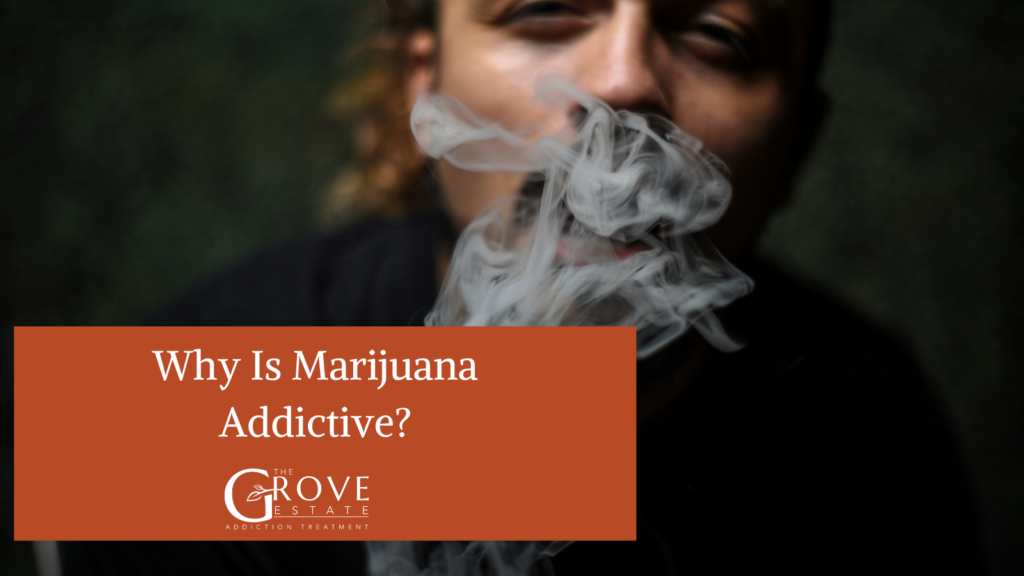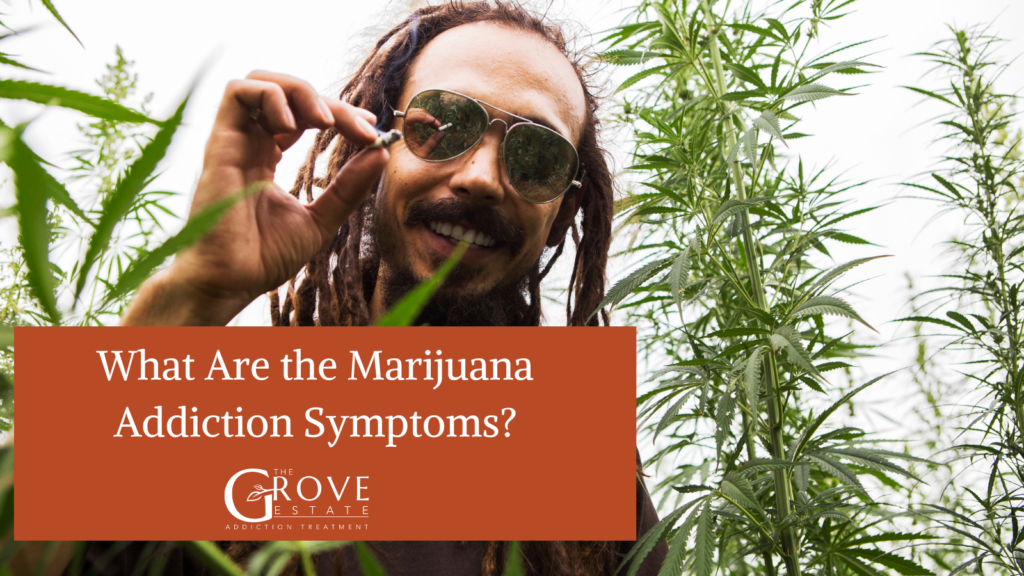Marijuana addiction is the persistent use of marijuana despite negative consequences for the user. These negative consequences could be physical, emotional, or psychosocial.
According to a 2019 survey by Substance Abuse and Mental Health Services Administration, 48.2 million or 18% of Americans have used marijuana. S. Hasin et al., in thier 2015 research ‘Prevalence of Marijuana Use Disorders in the United States Between 2001–2002 and 2012–2013’, showed that 3 in 10 marijuana users are addicted to it.
Effects like altered perception, difficulty controlling movements, disrupted memory, and loss of appetite among others are some of the negative effects it has on addicts. Treatment often revolves around therapy as marijuana is very psychoactive.
What Is Marijuana?
Marijuana refers to the dried leaves, flowers, stems, and seeds of the Cannabis sativa plant. This plant contains a psychoactive compound called delta-9-tetrahydrocannabinol (THC), which is responsible for the mind-altering effects associated with marijuana use. Marijuana is also known by various colloquial terms such as weed, pot, grass, bud, herb, ganja, and mary jane.
The drug can be consumed in various ways, including smoking it as a hand-rolled cigarette (joint) or using a pipe (bong). It can also be smoked in a cigar filled with a mixture of marijuana and tobacco, known as a blunt. Another method of ingestion involves incorporating marijuana into food or brewing it as tea.
Marijuana is considered the most commonly used illicit drug in some regions, and its use is subject to legal regulations in many places.

Why Is Marijuana Addictive?
The addictive nature of marijuana is primarily associated with its psychoactive compound, delta-9-tetrahydrocannabinol (THC). THC binds to cannabinoid receptors in the brain, particularly in areas related to pleasure, memory, thinking, concentration, coordination, and sensory perception.
Here are a few reasons why some people become addicted to marijuana:
- Reward System Activation: THC stimulates the brain’s reward system, leading to the release of dopamine, a neurotransmitter associated with pleasure and reinforcement. This reward mechanism can create a desire to repeat the behavior, contributing to the development of a habit.
- Tolerance: With regular use of marijuana, the body can develop tolerance, meaning that over time, individuals may need higher doses to achieve the same effects. This eventually results in addiction as the user is locked in a vicious cycle.
- Withdrawal Symptoms: Although withdrawal symptoms from marijuana are generally milder compared to other substances, some individuals may experience irritability, insomnia, decreased appetite, anxiety, and mood swings when trying to quit or cut down on use. These symptoms can contribute to a cycle of dependence.
- Psychological Dependence: Some individuals may develop a psychological dependence on marijuana as a way to cope with stress, anxiety, or other underlying issues. The drug may become a crutch for managing emotions or situations.
What Are the Effects of Marijuana Abuse?
Marijuana abuse can have profound effects on both the brain and overall well-being. The active compound delta-9-tetrahydrocannabinol (THC) interacts with the brain’s cannabinoid receptors. Marijuana over stimulates these receptors, leading to the characteristic “high” and various associated effects. Chronic marijuana abuse can result in:
- Altered perceptions and mood: Users may experience changes in perception and mood, with potential effects ranging from euphoria to anxiety and paranoia.
- Impaired coordination: Marijuana use can affect motor skills and coordination, leading to impaired physical performance and an increased risk of accidents.
- Difficulty with thinking and problem-solving: Cognitive functions, including thinking, problem-solving, and decision-making, may be adversely affected by marijuana abuse.
- Disrupted learning and memory: Marijuana can interfere with the ability to learn and recall information, impacting memory formation and retention.
- Decreased appetite: The well-known “munchies” phenomenon can lead to increased food consumption during the acute effects of marijuana use, but chronic abuse may result in decreased appetite and nutritional deficiencies.
Other negative effects include poorer mental and physical health, increased relationship problems, and reduced academic or career success compared to non-users. Additionally, according to a study by Silins E, Horwood L, and Patton G, in 2014 ‘Young adult sequelae of adolescent cannabis use: an integrative analysis’ marijuana abuse is linked to a higher likelihood of dropping out of school. In workplace settings, marijuana use is associated with increased absences, tardiness, accidents, workers’ compensation claims, and job turnover.
What Is Considered Heavy Use of Marijuana?
Heavy use of marijuana typically refers to consistent, daily, or near-daily consumption at levels causing intoxication. This pattern, sustained over months or years, is described as chronic or prolonged use. Understanding the distinction between occasional and heavy use is crucial for assessing the potential risks and consequences of prolonged marijuana consumption.

What Are the Marijuana Addiction Symptoms?
Marijuana addiction has varied symptoms in the individuals affected. The symptoms can be divided into behavioral and physical symptoms.
Behavioral symptoms include:
- Altered perception of reality.
- Difficulty in controlling movements.
- Challenges in thinking and problem-solving.
- Persistent difficulties in learning and memory.
Physical symptoms include:
- Visibly irritated or red eyes.
- A cough with mucus indicates respiratory issues.
- Increased heart rate.
- Persistent sensation of dryness.
- Heightened negative emotions.
- Difficulty retaining information.
- Unsteadiness in physical movements.
- Delayed response to stimuli.
- Difficulty managing use despite negative consequences.
How Does Marijuana Addiction Treatment and Recovery Look Like?
Marijuana addiction treatment and recovery primarily focus on therapeutic interventions. This is because marijuana addiction is largely psychological. Here are the key aspects of marijuana addiction treatment and recovery:
1. Therapy as Cornerstone
- Behavioral Therapy: Essential for addressing the psychological aspects of addiction, helping individuals understand the root causes and develop coping mechanisms.
- Craving and Relapse Management: Equips individuals with strategies to combat cravings and prevent relapses.
- Building Positive Habits: Aids in cultivating a balanced and positive lifestyle, fostering natural happiness and peace.
2. Support Groups
- Community and Camaraderie: Joining a marijuana addiction support group provides a sense of community along the recovery journey.
- Emotional Support: Offers genuine support, empathy, and encouragement from those with shared experiences.
3. Medication for Co-occurring Conditions
- If there is a co-occurring mental health condition, medication may be part of the treatment plan.
- Prescribing appropriate medication addresses underlying issues contributing to addiction.
4. Individualized Treatment Plans
- Tailored approaches, consider the unique needs and circumstances of each individual.
- Identifying and addressing any undiagnosed mental health conditions or traumas.
5. In-patient rehabilitation (if necessary)
- While most people can overcome marijuana addiction without in-patient rehabilitation, some individuals with severe cases or complex needs may benefit from this intensive approach.
- In-patient programs offer a structured environment for focused treatment.
Effectiveness of Marijuana Addiction Treatment on Individuals
The effectiveness of marijuana addiction treatment on individuals can vary based on factors such as the severity of addiction, the presence of co-occurring conditions, and the individual’s commitment to the treatment plan. Generally, marijuana addiction treatment that includes behavioral therapy, support groups, and possibly medication for co-occurring conditions is effective in helping individuals overcome their dependence on the drug.
The duration of treatment also varies from person to person. Some individuals see positive changes in a relatively short period, while others require more longer-term support. It’s crucial for treatment plans to be tailored to individual needs and adjusted as necessary to address specific challenges that may arise during the recovery process.
How Long Does It Take for Cannabinoid Receptors to Return to Normal?
Research conducted by Bonnet U, and Preuss U in 2017, titled ‘The cannabis withdrawal syndrome: current insight’ shows that cannabinoid receptors begin to return to this preuse state 2 days after abstinence. Full recovery happens after 4 weeks.
What Are the Marijuana Withdrawal Symptoms?
Marijuana withdrawal symptoms are things an individual who chronically uses marijuana will experience when they stop taking it. The symptoms vary and often start about 1 week after the individual stops. Some common marijuana withdrawal symptoms include:
- Irritability
- Insomnia
- Fatigue
- Reduced appetite
- Restlessness
- Depression
- Anxiety
- Difficulty concentrating
What to Expect During Recovery from Marijuana Addiction?
Recovery from marijuana addiction is a unique and individualized journey, and the experience can vary from person to person. However, there are some common aspects and expectations that individuals may encounter during the recovery process from marijuana addiction:
- Some individuals may experience withdrawal symptoms such as irritability, insomnia, fatigue, reduced appetite, restlessness, and mood swings. These symptoms are typically temporary and tend to diminish within a few days to weeks.
- Adjusting to life without marijuana may pose initial challenges, and individuals might face situations that trigger cravings. Developing coping strategies and seeking support are crucial during this phase.
- Behavioral therapy is often a central component of marijuana addiction treatment. Expect to engage in counseling sessions to address the psychological aspects of addiction, gain insights into triggers, and develop coping skills.
- Over time, cognitive functions improve as the brain adjusts to reduced or discontinued marijuana use. Improved memory, concentration, and problem-solving abilities are potential benefits of recovery.
- Emotional well-being often improves during recovery. Individuals may experience a reduction in anxiety, depression, and mood swings as the brain and body readjust.
- Recovery involves adopting healthier habits and lifestyle changes. This may include incorporating regular exercise, maintaining a balanced diet, and engaging in activities that promote overall well-being.
- Expect to learn and implement strategies for preventing relapse. Understanding triggers, developing coping mechanisms, and building a support network are vital components of relapse prevention.
Recovery is a gradual process that takes time. It’s important to approach recovery with a realistic mindset, understanding that it is a dynamic process. Seeking professional guidance, staying connected to support networks, and being proactive in adopting a healthier lifestyle contribute to a more successful and fulfilling recovery from marijuana addiction.
What Are the Risk Factors for Cannabis Use Disorder?
According to studies conducted in Japan and Canada, the main risk factors for Cannabis use disorder are:
- Early exposure to cannabis
- Psychiatric disorders before the use of cannabis
- High-stress levels
- Family history of mental illness
How many people are addicted to marijuana?
3 in 10 people who use marijuana are addicted to it. This is confirmed by Hasin DS, Saha TD, and Kerridge BT who conducted a study titled ‘Prevalence of marijuana use disorders in the United States between 2001-2002 and 2012-2013.’
What are the psychological effects of marijuana use?
Psychological effects may include altered perceptions, impaired coordination, difficulty in thinking and problem-solving, disrupted learning and memory, decreased appetite, and mood changes. The impact can vary based on factors like dosage, frequency of use, and individual differences.
What is considered heavy use of marijuana?
Heavy use of marijuana typically refers to consistent, daily, or near-daily consumption at levels causing intoxication. This pattern, sustained over months or years, is described as chronic or prolonged use.
What is bong lung?
Bong lung is characterized by large apical bullae in individuals who have heavy marijuana smoking. A clear cause-and-effect relationship between marijuana smoking and bullous lung disease has not been firmly established, and the observed association may simply be coincidental.
Can medical marijuana lead to addiction?
Yes, medical marijuana can lead to addiction. The risk increases with factors like a history of substance abuse, high doses, or long-term use. It’s crucial for individuals using medical marijuana to be monitored by healthcare professionals to mitigate the risk of developing dependence.
Are cravings normal during recovery from marijuana addiction?
Yes, experiencing cravings is a normal part of the recovery process from marijuana addiction. Cravings may arise due to psychological and environmental triggers. Developing coping mechanisms, participating in therapy, and having a support system are essential in managing cravings and preventing relapse during the recovery journey.
What is the impact of marijuana addiction on relationships?
Marijuana addiction can strain personal and professional relationships, leading to conflicts, communication breakdowns, and trust issues. The CDC notes that substance use disorders, including marijuana addiction, can disrupt family dynamics, affect parenting responsibilities, and diminish work performance. Recovery efforts often include addressing these relational impacts, with a focus on rebuilding trust and improving communication skills.
In addressing the broader effects of addiction, treatments for substances such as opium addiction also emphasize the importance of healing relationships. Participating in group counseling can offer insights into the interpersonal effects of addiction and provide strategies for mending and strengthening relationships. Through shared experiences and collective wisdom, individuals can learn how to navigate the complexities of interpersonal dynamics affected by substance use, enhancing their ability to connect with others in meaningful ways.

Share This Post



